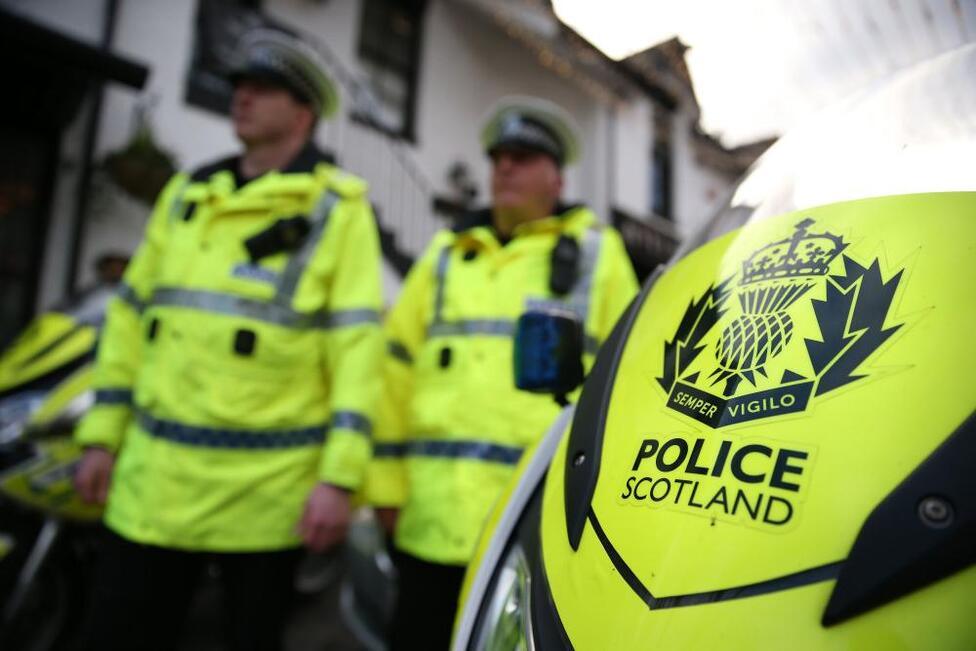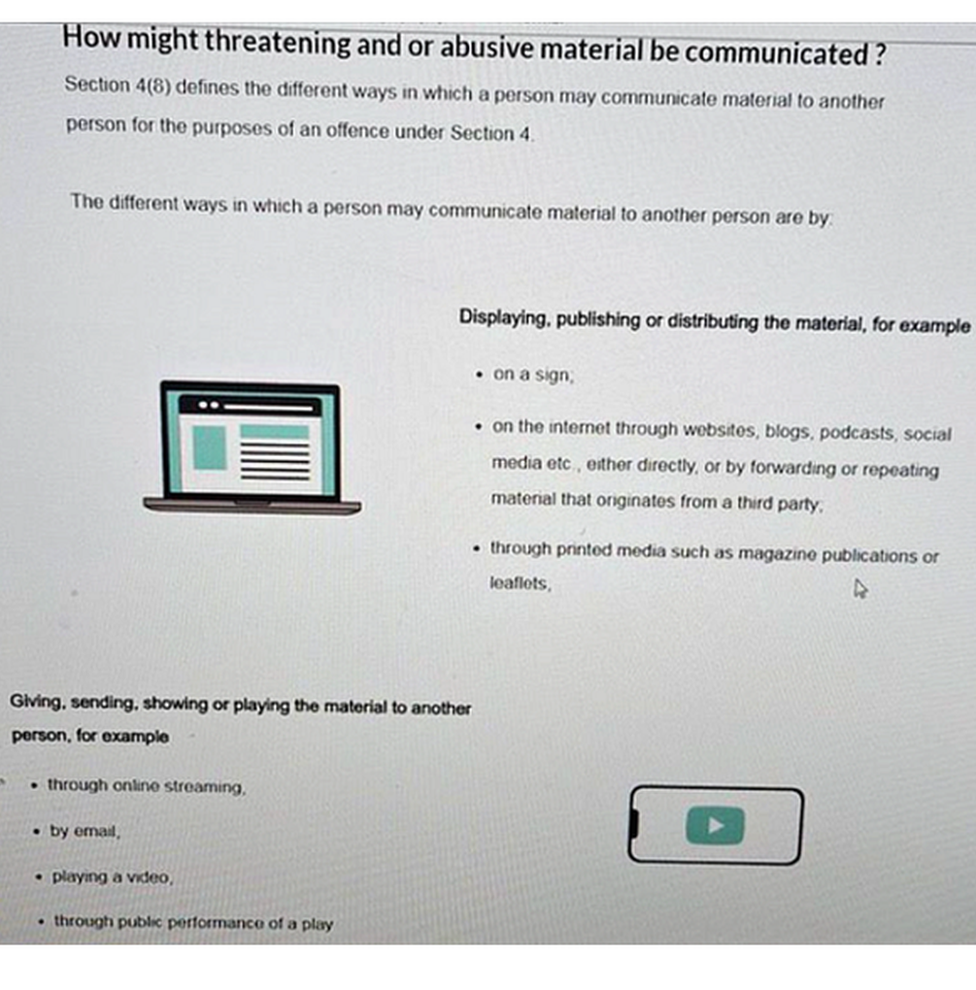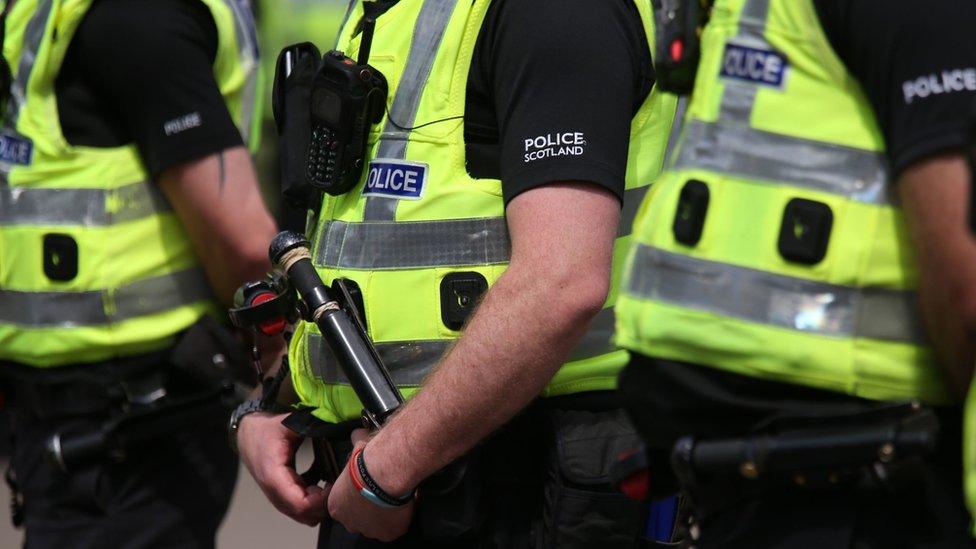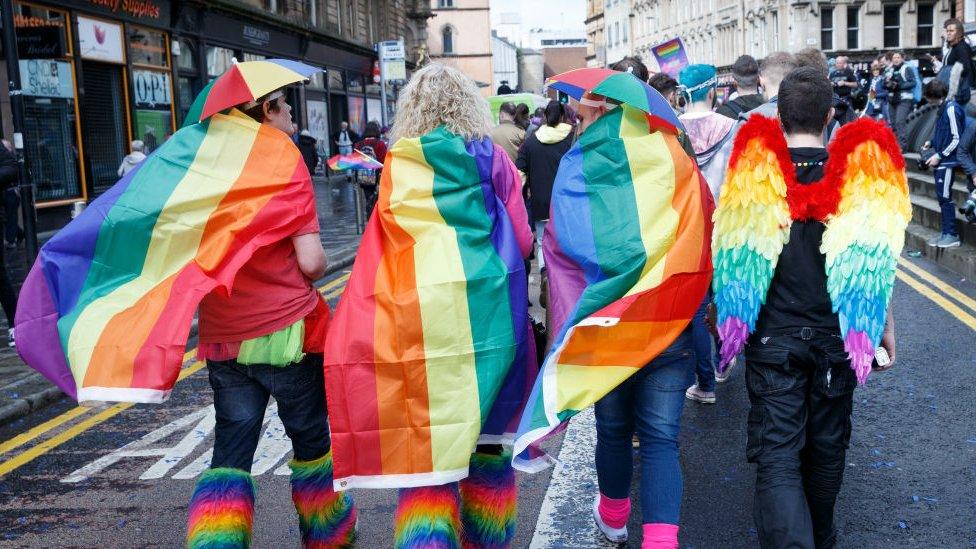Hate crimes: Police will not 'target performers'
- Published

There are concerns about how the new law will be enforced by police
Police Scotland have said they will not target performers when new hate crime laws come into force next month.
The laws say hate can be communicated through public performances, online, or by playing videos.
But officers will only respond to complaints and not go looking for offending material, the force have said.
A lawyer said performers and writers "must trust to luck" they are not prosecuted.
The Hate Crime and Public Order (Scotland) Act, external comes into force in Scotland on 1 April.
Ahead of this, Police Scotland have urged anyone either witnessing or targeted by hate crimes to come forward.
The force have pledged to investigate every complaint they receive.
The new law points out that material used for "stirring up hatred" could be communicated by playing a video, through public performance of a play, online, on a sign, or through printed media.
It adds that this could be spread through the spoken word, the written word, or by electronic communications either by the originator of the material or by forwarding or repeating the material.
Someone convicted of stirring up hate could face a fine and a prison term of up to seven years.
BBC Scotland has seen part of the material being used in a two-hour online course to train police officers in the new law. It lists the various ways and scenarios which could be investigated.

Details of the training have been covered in the media and shared across social media platforms.
This led to condemnation from several Scottish Conservative MSPs, with the party's justice spokesman Russell Findlay saying it was at "odds with the legislation".
No targeting
However, Police Scotland have defended the training. They said officers were only preparing to respond to hate crimes and incidents.
A statement from the force said: "Police Scotland is not instructing officers to target actors, comedians, or any other people or groups.
"The training material was based on the Scottish government's explanatory notes which accompany the legislation:, external.
"This included examples of a range of scenarios where offences might take place, but this does not mean officers have been told to target these situations or locations."
The statement added: "Police Scotland is a rights-based organisation and officers balance the protections people have under human rights legislation against other laws every day.
"Our training for the new act therefore reminds officers of their human rights obligations and it reflects all aspects of the new legislation, including the protection it includes around freedom of expression."
'Populist sounding laws'
Tony Lenehan KC, president of Faculty of Advocates Criminal Bar Association, said the public knowing what is and what is not a crime is a "vital part of any modern democracy".
"Where the new statute is woven with threads of subjectivity, the broadcasters, after dinner speakers, comedians, debaters and dramatists must trust to luck that they don't end up being prosecuted under it," he told BBC Scotland.
Mr Lenehan said most of the behaviour tackled by the hate crime legislation "would already be a crime" as public order offences, or using specific aggravations such as crimes involving religion and race.
"My fear is that this legislation is driven by the hope of a PR coup, from passing pleasingly populist sounding laws," he said.
'Mother of all April Fools' jokes'
The law criminalises threatening or abusive behaviour which is intended to stir up hatred against someone who possesses, or appears to possess, certain characteristics.
These differ from the protected characteristics in the UK-wide Equality Act 2010, external - age, disability, religion, sexual orientation, transgender identity and variations in sex characteristics.
While the law omits sex, to the criticism of women's groups, the police training does define transgender identity and includes people who identify as a gender different from their birth sex, as well as "non-binary people and cross-dressing people".
Harry Potter author JK Rowling is among the critics of the legislation, which she argues limits free speech.

JK Rowling said she would not delete any comments which could be considered criminal in Scotland
Writing on X, formerly Twitter, the author said she would not delete any comments which could be considered criminal in Scotland from April.
"If you genuinely imagine I'd delete posts calling a man a man, so as not to be prosecuted under this ludicrous law, stand by for the mother of all April Fools' jokes," she said.
Murray Blackburn Mackenzie, an Edinburgh-based policy analysis group, have been trying to seek assurances about the position of women's rights campaigners who are critical of gender policy.
"There has been no attempt over the past three years to involve those who had concerns about the act, to allay worries about how the police would handle complaints," they said.
"Police Scotland initially offered us the opportunity to look at the training materials before the act's commencement, but that has now been rescheduled for the first week in April."
Speaking on Tuesday, a Downing Street spokeswoman said Prime Minister Rishi Sunak would not consider similar laws in England.
Related topics
- Published14 March 2024

- Published7 March 2024

- Published11 March 2021
